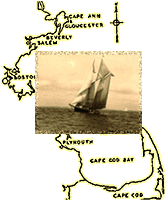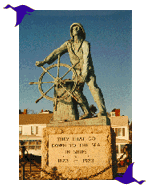
Tourists have been flocking to Gloucester recently to see the site of
the blockbuster movie The Perfect Storm, based in Sebastian Junger's
book about the crew of the Andrea Gail that was lost at sea in 1991.
But today we meet a guy who was writing about Gloucester's traumas at
sea before Junger was even born. Joe Garland is a story-teller,
journalist, historian...He's written a dozen books about Gloucester's
maritime history. He's also a friend of The Savvy Traveler's Sandy
Tolan, also from Gloucester. Sandy went out for a boat ride on Joe's
26 foot sloop to hear more history of this small town that's suddenly
getting so much attention.
Quintessential Gloucester
by Sandy Tolan
Maybe you've heard about Gloucester from the best-seller, The Perfect
Storm, Sebastian Junger's book about the crew of the Andrea Gail
that was lost at sea in 1991. But Joe Garland was writing about Gloucester's
traumas at sea before Junger was born. For us in Gloucester, Joe Garland
is our story-teller. Journalist, historian, Joe's written a dozen books on
the maritime history here. He seems to know every cut of land, nearly
every building in the city laid out before us, and who sailed where, and
when, and how for more than three centuries, they've traveled hundreds of
miles to the fabled fishing grounds at George's Bank and the Grand Banks
off the coast of Newfoundland.
 I pull out a book of photographs -- Gloucester on the Wind, old photos Joe
has compiled and written captions for, showing Gloucester in the days of
sail. There's one of old Howard Blackburn. In Lone Voyager, Joe
told the story of Gloucester's most legendary fisherman: in 1893, after
being separated from his mother ship in a terrible winter storm, he rowed
65 miles in a little dory, without gloves, in bitter cold, to the coast of
Newfoundland. His dory mate died, and Blackburn lost all his fingers. And
there he is in the picture, fingerless, out for a sail in this same
Gloucester harbor.
I pull out a book of photographs -- Gloucester on the Wind, old photos Joe
has compiled and written captions for, showing Gloucester in the days of
sail. There's one of old Howard Blackburn. In Lone Voyager, Joe
told the story of Gloucester's most legendary fisherman: in 1893, after
being separated from his mother ship in a terrible winter storm, he rowed
65 miles in a little dory, without gloves, in bitter cold, to the coast of
Newfoundland. His dory mate died, and Blackburn lost all his fingers. And
there he is in the picture, fingerless, out for a sail in this same
Gloucester harbor.
Joe: "I can hold this here like this and look across the harbor, there's
the beach, we're sitting exactly where he was sailing."
Picture after picture shows the acre after acre on shore given to the cod,
salted to preserve it, placed in wooden frames called flakes, sun cured,
and then shipped across the world.
Joe: "And the business got so big, the roofs of the buildings were covered
with these fish flakes."
Sandy: "And that's right across the street from where my house is.
Joe: "Right across the street from where your house is...in the heyday,
Gloucester was the saltfish capital of the world. It was the biggest
fishing port in the western hemisphere."
 That hasn't been the case in a long time. Joe's going to take us into the
inner harbor, to see the change.
That hasn't been the case in a long time. Joe's going to take us into the
inner harbor, to see the change.
We move down the shoreline, near where Clarence Birdseye perfected his
freezing process and put the salted cod out of business; under the line
of fire of British cannonballs, fired by Captain Robert Linzee in 1775,
before Gloucester patriots chased him off; and now past the paint factory,
scene of more recent battles. For more than a century, this great red
wooden icon to the fishing industry applied the copper paint that protected
the bottom of the wooden schooners. Last year developers proposed to
convert the abandoned building into condos; they were unsuccessful.
Joe: "We still want to hang onto everything we can of the fishing industry,
and the paint factory symbolizes all that. And the idea of the paint
factory, being squarely at the entrance to our harbor, being turned into
condominiums didn't sit well with a lot of us."
We're at ground zero of Gloucester's change. From here you can see past,
present and future: the Gloucester adventure, the last of the Gloucester
fishing schooners up on the rails for historical renovation; a handful of
steel hulled fishing trawlers headed out toward the fishing grounds that
remain; and yachts, and little sailboats, and a replica of an old fishing
schooner, with tourists on board, out for a sail, and jet skis, and
kayakers, and whale watch boats, and the newest entry into Gloucester
harbor, the casino ship: first came the Vegas Express, then the Eldorado,
now, waiting to come on line, the Southern Elegance, built to look like an
old riverboat.
Joe: "Maybe one gambling ship, you can take, two gambling ships, you raise
an eyebrow. But three gambling ships, you're looking at Gloucester
becoming the gambling center of New England, or the gambling center of the
East Coast, and there's a lot of us who don't like it at all."
 In a year of operation more than 75,000 people have boarded the casino
ships; the Vegas Express employs 120 people, most local, on a weekly
payroll of about 80 thousand dollars. And, Joe acknowledges, with the
fishing down, the wharf owners need some kind of business. And so the
change. If you want to know what's changed around here, says Joe Garland,
you need only sniff the air.
In a year of operation more than 75,000 people have boarded the casino
ships; the Vegas Express employs 120 people, most local, on a weekly
payroll of about 80 thousand dollars. And, Joe acknowledges, with the
fishing down, the wharf owners need some kind of business. And so the
change. If you want to know what's changed around here, says Joe Garland,
you need only sniff the air.
Joe: "There's a little bit of smell of fish but nothing the way it was in
the old times. The old times, the whole harbor here would be redolent of
this strong, strong smell of salt fish being dried in those fish flakes,
mixed in with that just enough soupçon of rotten fish, fish heads
and stuff
that had been thrown overboard from the cleaning of the fish to add another
level of elegance, if you will, to the compost. It was tangy, it
really caught you by the nostrils and in the lungs, but boy, it spelled
Gloucester and the sea.
Joe: "There are going to be great changes here. The big question is, are
we going to be able to hang on to this strange uniqueness what we have had,
and I hope we can hang onto that. We're going to have to change."
At stake here, says Joe Garland, is the sense of place that people here
have always had. The hope that we will stay connected to who we've been --
a safe harbor for the people who live here.
 Joe: "I've seen an account in an old newspaper where literally hundreds of
schooners sailed in here one afternoon, because the barometer told them
there was going to be threatening weather, and they come here almost like a
parade, and dropped anchor in the harbor here, and the guy counted them it
was something like two or three hundred schooners just in the outer harbor
here at anchor. The next morning, when the breeze came up and it was a
fair breeze, and how one after another they got their sails up and they
sailed out of the harbor, as if organized in a parade, and the sight, as I
think about it, it brings almost a lump to my throat, as I think about the
sights that this harbor has seen and the vessels it's harbored."
Joe: "I've seen an account in an old newspaper where literally hundreds of
schooners sailed in here one afternoon, because the barometer told them
there was going to be threatening weather, and they come here almost like a
parade, and dropped anchor in the harbor here, and the guy counted them it
was something like two or three hundred schooners just in the outer harbor
here at anchor. The next morning, when the breeze came up and it was a
fair breeze, and how one after another they got their sails up and they
sailed out of the harbor, as if organized in a parade, and the sight, as I
think about it, it brings almost a lump to my throat, as I think about the
sights that this harbor has seen and the vessels it's harbored."
We've drifted in front of the quintessential Gloucester figure: the bronze
man at the wheel, standing at the boulevard, at the edge of the harbor --
turned green with salt and time, in his oilskins, at the helm, eyes on the
sea. Joe reads the final passage from his book, the Gloucester Guide:
Joe: "Braced against the cant of his schooner's deck, gripping the wheel,
the weather eye on the set of his jib, shaping his course out this harbor
to come about out there beyond eastern point, sails thundering, spray
flying across his bow, sheets hauled full and by for the fishing banks."
A great chronicler of this place, old Joe Garland looks up from his boat,
fixing his eyes on the silent man of bronze, the man at the wheel,
gazing out toward the fishing grounds.
From Gloucester, Massachusetts, this is Sandy Tolan for The Savvy Traveler.
|
Savvy Resources for Gloucester:
The 15th annual Gloucester Schooner Festival is Sept.
2-3, 2000. The festival features an open house aboard the 121-foot
Gloucester schooner Adventure under restoration at the Essex
Shipbuilding Museum in Essex; a fish fry on Saturday from 3 to 7
p.m., followed by a lighted ship parade and fireworks; and a schooner
race on Sept. 3. For those who would like to sail on one of the
vessels during the race, limited space is available at $100 a person.
Some vessels also have space on their journey from Maine or Boston to
Gloucester. Space is also available on the power spectator craft
that will operate parallel to the race course ($65 a person). For
information on sailing on one of the vessels, call the Boston
Nautical Heritage Group at 781-344-1749.
Gloucester Harbor will also be the scene of a Waterfront Festival
Aug. 19-20, 2000. More than 250 artisans and craftspeople are expected to
participate. For information on either event, call the Cape Ann
Chamber of Commerce at 978-283-1601.
|
Books by Joe Garland, avaialble from Amazon.com:
Gloucester on the Wind: America's Greatest Fishing Port in the Days of Sail
Lone Voyager: The Extraordinary Adventures of Howard Blackburn, Hero Fisherman of Gloucester
Eastern Point: A Nautical, Rustical, and Social Chronicle of Gloucester's
Outer Shield and Inner Sanctum, 1606-1990
The North Shore: A Social History of Summers Among the Noteworthy,
Fashionable, Rich, Eccentric, and Ordinary on Boston's Gold Coast
Beam Reach: Further Voyaging in the Gloucester Daily Times
|





 I pull out a book of photographs -- Gloucester on the Wind, old photos Joe
has compiled and written captions for, showing Gloucester in the days of
sail. There's one of old Howard Blackburn. In Lone Voyager, Joe
told the story of Gloucester's most legendary fisherman: in 1893, after
being separated from his mother ship in a terrible winter storm, he rowed
65 miles in a little dory, without gloves, in bitter cold, to the coast of
Newfoundland. His dory mate died, and Blackburn lost all his fingers. And
there he is in the picture, fingerless, out for a sail in this same
Gloucester harbor.
I pull out a book of photographs -- Gloucester on the Wind, old photos Joe
has compiled and written captions for, showing Gloucester in the days of
sail. There's one of old Howard Blackburn. In Lone Voyager, Joe
told the story of Gloucester's most legendary fisherman: in 1893, after
being separated from his mother ship in a terrible winter storm, he rowed
65 miles in a little dory, without gloves, in bitter cold, to the coast of
Newfoundland. His dory mate died, and Blackburn lost all his fingers. And
there he is in the picture, fingerless, out for a sail in this same
Gloucester harbor.
 That hasn't been the case in a long time. Joe's going to take us into the
inner harbor, to see the change.
That hasn't been the case in a long time. Joe's going to take us into the
inner harbor, to see the change.
 In a year of operation more than 75,000 people have boarded the casino
ships; the Vegas Express employs 120 people, most local, on a weekly
payroll of about 80 thousand dollars. And, Joe acknowledges, with the
fishing down, the wharf owners need some kind of business. And so the
change. If you want to know what's changed around here, says Joe Garland,
you need only sniff the air.
In a year of operation more than 75,000 people have boarded the casino
ships; the Vegas Express employs 120 people, most local, on a weekly
payroll of about 80 thousand dollars. And, Joe acknowledges, with the
fishing down, the wharf owners need some kind of business. And so the
change. If you want to know what's changed around here, says Joe Garland,
you need only sniff the air.
 Joe: "I've seen an account in an old newspaper where literally hundreds of
schooners sailed in here one afternoon, because the barometer told them
there was going to be threatening weather, and they come here almost like a
parade, and dropped anchor in the harbor here, and the guy counted them it
was something like two or three hundred schooners just in the outer harbor
here at anchor. The next morning, when the breeze came up and it was a
fair breeze, and how one after another they got their sails up and they
sailed out of the harbor, as if organized in a parade, and the sight, as I
think about it, it brings almost a lump to my throat, as I think about the
sights that this harbor has seen and the vessels it's harbored."
Joe: "I've seen an account in an old newspaper where literally hundreds of
schooners sailed in here one afternoon, because the barometer told them
there was going to be threatening weather, and they come here almost like a
parade, and dropped anchor in the harbor here, and the guy counted them it
was something like two or three hundred schooners just in the outer harbor
here at anchor. The next morning, when the breeze came up and it was a
fair breeze, and how one after another they got their sails up and they
sailed out of the harbor, as if organized in a parade, and the sight, as I
think about it, it brings almost a lump to my throat, as I think about the
sights that this harbor has seen and the vessels it's harbored."